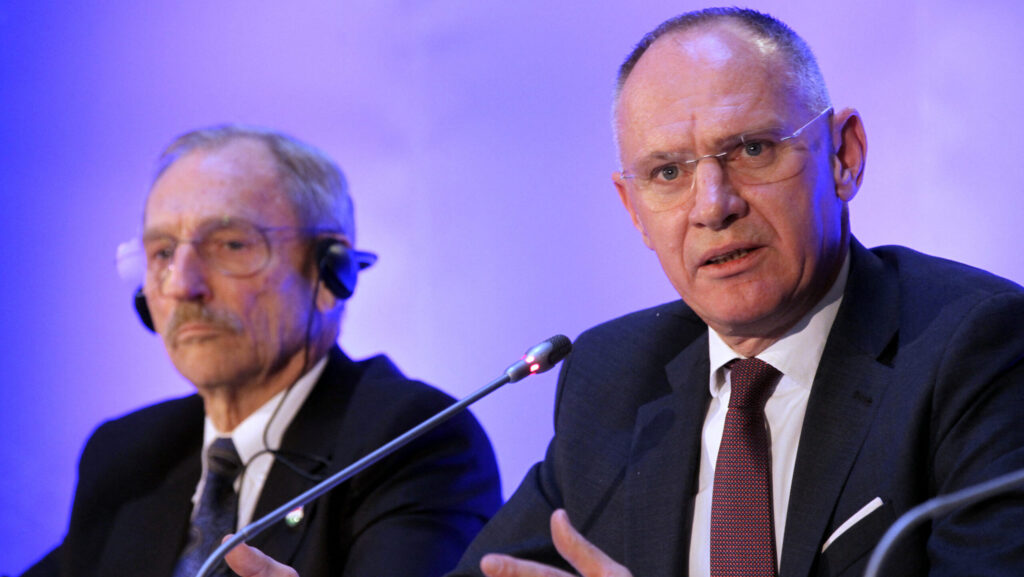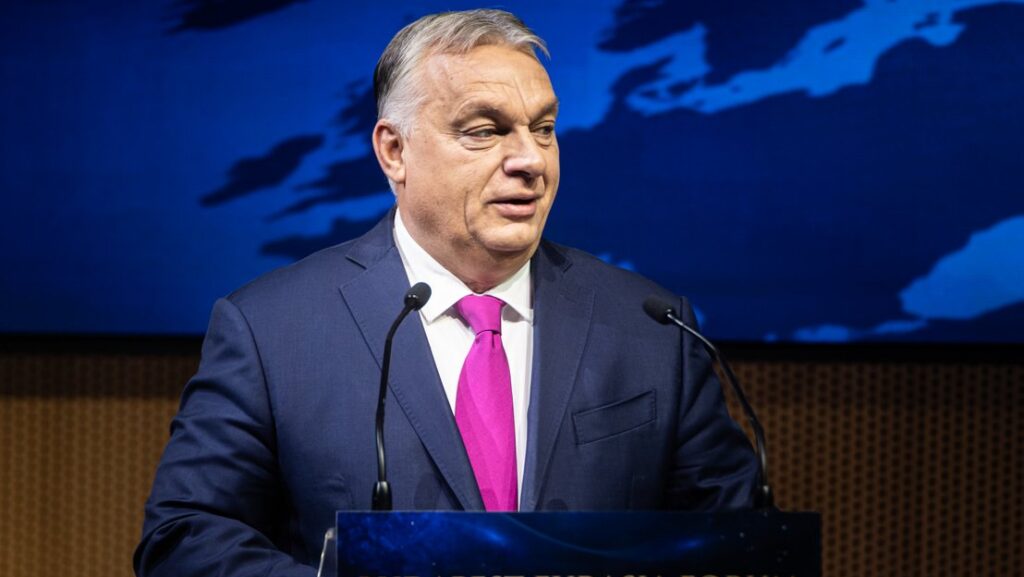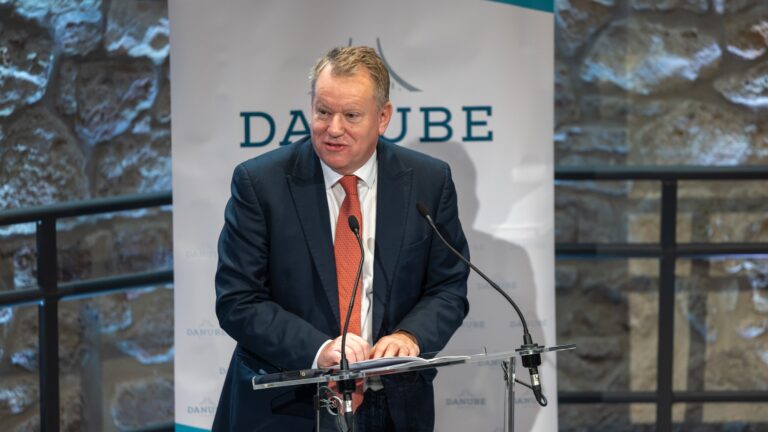Andreas Rödder in Interview with Kristóf Joób
The European Commission is undertaking a huge risk by intentionally amplifying the conflicts between member states and Brussels, highlights German historian and Christian Democratic politician Andreas Rödder. While speaking to the author of the highly successful volume Konservativ 21.0: Eine Agenda für Deutschland (C. H. Beck, 2019)—published in Hungarian by MCC Press under the title Konzervatív 21.0 – A polgári Németország programja in July 2021—we discussed the future chances of conservatism, the possible political role of Christianity, and how the ‘rainbow culture’ in Germany uses Hungary as an antipole, a perceived enemy, to forge an identity for itself.
It was a really interesting experience for me to see in the spring of 2010, even before Fidesz won the elections and the government was formed, that German politics was already wary of the Hungarian right coming to power. What could have been the reason for this distrust in advance? The simple fact, per se, that a right-wing turn was expected to occur in an East Central European country?
As far as I remember, the current negative German attitude towards Hungary in politics and in the media was not typical previously. In this regard, the major shift occurred in September 2015. I believe Hungary fell into a communication trap. Perceptions of the German public and the discourse in Germany have changed considerably in the last few years, in the spirit of Willkommenskultur.
Did the change really start to happen at that point in time, or did it begin earlier?
The process began earlier, but it peaked in 2015. The situation is that German society is, to a large extent, currently under the influence of post-colonial identity politics. Philosophically, and in terms of the academic sphere, this can be traced back to the 1970s and 1980s, but what I termed ‘rainbow culture’ long before this year’s European football championship became a dominant paradigm in Western societies after the global financial crisis of 2008 and the collapse of the radically pro-market approach. Prior to that, at the turn of the millennium, a lot of people still believed that society as a whole, including education, culture, and the healthcare system, could be shaped purely on the basis of market rationality. This concept lost its credibility in 2008, and the vacuum left behind was occupied by rainbow culture. An entire social movement grew out of it, and we can already see what a wide spectrum it has. Fridays for Future, No Borders No Nations, identity politics, etc.
What you are saying is especially interesting as the 2008 crisis was essentially a financial and social crisis, whereas the ideas occupying the vacuum left by it rather concern ideology and culture.
Indeed. However, market radicalism was not only an economic and social phenomenon, but also a cultural one, as this paradigm also implied that the market was capable of controlling culture as well. Just consider, for example, the launching of entrepreneurial universities. As a person with a conservative mindset, I say that learning and knowledge are not commercial commodities. This concern, however, was not considered an obstacle by market liberalism at all. Students became clients, and the rector became the chief executive officer of the university. Learning was turned into merchandise, almost as Marxists would put it: non-marketable goods were turned into commodities. This was the experience of post-communist societies, too: the Western model was about the market, and nothing but the market. It was this ideological dimension which lost its credibility in 2008.
And was that when the ‘rainbow culture’ arrived?
Yes, it penetrated the ensuing vacuum, and this process affected at least three different areas: the issues of gender, nations, and the Western model of society in general
Yes, it penetrated the ensuing vacuum, and this process affected at least three different areas: the issues of gender, nations, and the Western model of society in general. We can see this again in gender politics, in identity politics, and, in correlation with this, in post-colonialism. And the concept of the nation is questioned by the No Borders No Nations movement. All these combined make up a ‘coalition’ with a rather strong influence on public opinion in Western societies. It resulted in a fundamental change of political culture in Germany, and the psychological mechanism is well known: in order to forge an identity, enemies are needed. This creation of a new identity culminated in the autumn of 2015 in Germany, in the form of Willkommenskultur. The perceived enemy was Viktor Orbán himself, who allegedly let migrants suffer at Keleti Railway Station without food and water. A film was made about Merkel’s actions during the migrant crisis of 2015. The images showing her making the decision to let the migrants in carry a clear message and are strongly suggestive. Migrants are denied water at Keleti, Orbán is letting them suffer. These images have taken on a life of their own since then, to such an extent that now it is enough to say Hungary or the name Orbán, and people in Germany will associate them with those images right away, as a reflex.
Is German society as a whole pervaded by this, or only a part of it?
Public opinion is. According to Elisabeth Noelle-Neumann’s famous definition, public opinion is whatever you can say in public without isolating yourself by doing so.
Is this the only kind of public opinion? Can we not assume there is another one, one that also tolerates different opinions?
Even for me, someone who tries to keep track of issues in Hungary in a much more differentiated manner than German public opinion, it is rather difficult to obtain a clear picture of the freedom of the media or the Child Protection Act from outside. People who we refer to when we use the term ‘public opinion’, workers in a Volkswagen factory, for instance, are in a much less favourable position to be able to formulate an accurate judgement on such issues. The subject does not interest them too much, either, but since public opinion is controlled in such a one-sided manner, this is the approach that will be finally fixed in their heads.
And opinion leaders who would be capable of obtaining a more nuanced view do not even try to do so?
There is the language issue, for one thing, a lack of accurate and up-to-date information in German. But the question is, also, whether they really want to understand issues at all. For instance, I tried to find information on the Child Protection Act. It took a rather long time for me to have the actual text in my hands. But now, at last, I am in a position to say that authors of related articles published in the media in Germany did not have accurate information on the subject.
That was also my experience.
We should not underestimate what happened during UEFA Euro 2020, either. It triggered very strong reflexes. What Ursula von der Leyen and Markus Söder did in relation to the rainbow was a bi-directional campaign. It was like taking an oath of allegiance to LMBTQ and at the same time taking a stand against Hungary. Hungary, by playing the bad boy, has a functional role now in the process of transformation in Germany. This is exactly what makes the situation so difficult: it would be extremely hard to shake off such a role. The main problem with this rainbow culture, by the way, is that it is just unable to reflect on itself. It portrays any kind of order as a tyrannical construction, while it looks upon itself as an exception. And this is exactly what produces the intolerance and authoritarianism of this culture.
Seemingly, it works like a substitute for faith, and its followers behave as defenders of the one and only true religion.
Yes, regarding climate policy as well as gender politics, this is the prevalent attitude. A person who dares to deny climate change is a heretic. This is madness, pervading just about everything. What is more, it is based on mixing up two different categories, tolerance and affirmation. In a pluralistic society, tolerance means that I have to tolerate certain things, whether I like them or not. Affirmation, however, means that I do not only have to tolerate something, but I also have to greatly appreciate and confirm it. This is what we witnessed with the rainbow culture during the European Football Championship. My youngest daughter told me about how aggressively some people tried to make her hold a rainbow flag at Munich Stadium, and when she said she did not feel like it, they were appalled. Behind all this, one can make out the outlines of the current transition from tolerance to ideological coercion which has been ongoing since the 1970s and 1980s and is brutally sweeping over Western societies at the moment.
With hysterical aggressivity, against which the proponents of tolerance keep warning us. This kind of intolerance and conjuring the image of an enemy are familiar from the history of totalitarianism, from national socialist and communist dictatorships.
Exactly. I often think about the Chinese Cultural Revolution and the Red Guard. Just recently, my wife was summoned to the anti-discrimination committee of the school where she teaches. It almost sounds like the Jacobin Committee of Public Safety. The mechanisms involved work exactly the same way now. This is an extremely alarming phenomenon.
With new Marats and Robespierres…
This is the consequence of the abuse of morality. Those who monopolize moral verities will invariably become intolerant.
What chance does any kind of conservatism have in a Germany evolving this way, or in Europe, for that matter?
My concept of conservatism is not subject to the issue of identity politics, and it strongly relies on the Anglo-Saxon conservative tradition, especially on Edmund Burke. Frankly, pre-1945 German conservatism is not very promising; there is not much to draw from it. On the other hand, I think the kind of traditionalism which proposes that everything should stay as it is, trying to stop or turn back time, cannot be properly regarded as conservative. The secret of British conservative thought is that it makes inevitable change understandable and palatable for people. This mentality, of course, adopted by Benjamin Disraeli and Robert Salisbury, among others, has always been prone to the accusation that it renounces the quest for eternal truths.
Does this kind of conservative thinking have a place in the current German and European political climate?
The chance must be ensured that it does have a place. I do believe that Boris Johnson, for instance, has the means to represent certain values of this conservatism. To reverse the question, if one had asked in Great Britain in 1976 whether it was still possible to stop the decline of the country, in all probability rather sceptical answers would have been given. Margaret Thatcher, however, managed to turn the tide only three years later. In this respect I am not a cultural pessimist, instead I am a civic optimist. All I am saying is that we should fight for it, and this is a direct call to civic parties to also do something for it, as well as direct criticism aimed at them because, for instance, the secretary general of the CSU says, ‘hands off identity politics!’ Well, yes, if we prefer not to engage in such debates, then we will lose them before they start.
A question arises that is difficult to bypass. In the name of the German union parties and several other European Christian Democratic parties, the word ‘Christian’ is still included. What role may Christianity still have, if it can have a role at all, in German and European politics?
This is a rather complex issue. I am somewhat clueless about it, really. I would start with two criteria of exclusion. First, the Christian orientation in politics must not be based exclusively on denomination. This luxury is impossible to afford in a country where only about half of the population is Christian, and most of them only ‘on paper’. It also makes it difficult to find an answer if such a party also has Muslim members. I know conservatives who adopt a line of argumentation strongly based on natural law, but I am rather sceptical about that. I may be a conservative who is too postmodernist for this.
Then what exactly is denoted by the term ‘Christian’ in this context
I would say the term refers to three things which alone would satisfy me. First, the importance of the person, the persona, and human dignity. The second thing I deem particularly important is the concept of the fallibility and frailness of man, since this is what protects conservative thinking from doctrinaire ideologies and obsessive ideas of creating a new humanity and a new world. Third, the fundamental principle of subsidiarity which can be deduced from the Christian social doctrine, putting the individual’s responsibility on the top shelf and only activating the solidarity of society once the individual’s assumption of responsibility becomes unviable for some reason. This would be my idea of politics based on Christianity.
Now that subsidiarity has been mentioned, let us say a few words about the European Union. Alongside Hungary and Poland with a traditionally strong European orientation, it is precisely Germany, though for different historical reasons, which also has the courage to deviate from certain prevailing views regarding the necessary degree of integration—an interesting ambiguity.
On the one hand, there is this commitment to the European concept on an ideological level, but on the other hand, protection of law and order is also part of the German political tradition
The current reflex that the nation state is bad and Europe is good is a consequence of German history. This approach is deeply embedded in the German political consciousness even in the case of figures such as Helmut Kohl. In his last years, he also turned into a pro-Europe evangelist, at a time when more realism could have been expected of the participants in the course of setting up the euro system. So, on the one hand, there is this commitment to the European concept on an ideological level, but on the other hand, protection of law and order and the principle of subsidiarity is also part of the German political tradition. The same Helmut Kohl who was one of the prominent supporters of introducing the euro, a basic pan-European step, did everything he could to ensure that the principle of subsidiarity should be stipulated in the Treaties of the Union. And we also have the German Constitutional Court, which, with all the power of making fine distinctions, a characteristic feature of German constitutional law, defined the EU as a confederation of states, adopting a special concept of constitutional law. What we are seeing now is nothing else but Karlsruhe simply confronting the European Commission with a clear-cut German interpretation of the Treaties of the Union. And this is in sharp contrast with the Commission’s tendency not to perceive the EU as a confederation of states, but to increasingly perceive it as a federal state. According to the German Constitutional Court, such an interpretation conflicts with the German Constitution, and a referendum would be necessary in Germany for its adoption. This would be a highly significant step to take, naturally, but constitutional judges believe if it must happen, it must happen in this way. And not by stealth, which is what Brussels is pushing for.
Is this, then, a nation state approach that has now been adopted by the German Federal Constitutional Court?
Yes, Karlsruhe is saying that individual nations, the member states themselves, continue to be the bearers of sovereignty. The European Union by itself has no sovereignty, or rather, has it only if it is authorized to.
But this approach contradicts the pro-integration voices which can often be heard in German politics.
There is tension in this regard, no doubt about it. There are some advocates of the sovereignty of the nation state in Germany, including the Constitutional Court, the Bundesbank, and the federal Finance Ministry. This tension has always been there, but so far, the balance has been preserved successfully. The balance, however, is being threatened by the ongoing infringement procedure launched against Germany. What is at the heart of the matter is a power struggle in the background between the German Constitutional Court, the European Commission, and the European Court of Justice, with the looming prospect of an especially sharp confrontation. Just think about it for a second, what a strange situation it is when a German chairperson of the Commission throws down the gauntlet to the German Constitutional Court. What I find problematic is that the current European Commission consciously amplifies conflicts to the extreme, which could only be handled effectively by avoiding the intensification of tensions. The antagonism already cuts rather deep as it is. Brussels’ centralization drive, manifested in Next Generation EU, for instance, is opposed by Germany, Poland, Hungary, and the Frugal Five (the Netherlands, Austria, Sweden, Denmark, and Finland).
And there is Brexit…
Yes, indeed, there is Brexit, too. So that means eight member states out of the remaining twenty-seven are together in this. I am convinced that the European Commission is undertaking a huge risk with this approach, since nothing guarantees that the EU in its current form will exist forever. Well, it is a rather reckless thing to risk this. The 1914 July Crisis which preceded the First World War also began when a clarification of the situation was attempted by escalating the situation. We should all keep in mind what the final result of that turned out to be.
Translated by Balázs Sümegi








